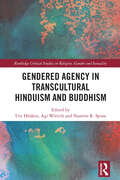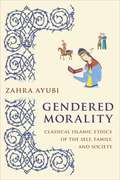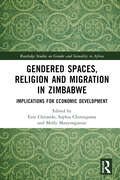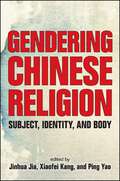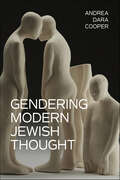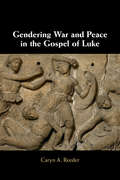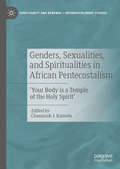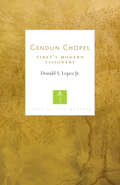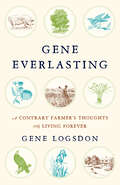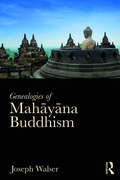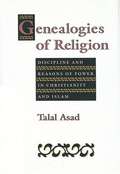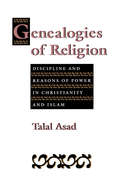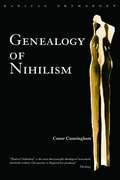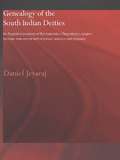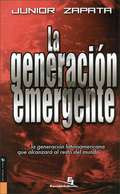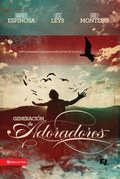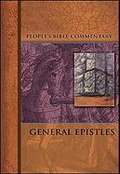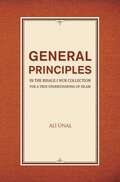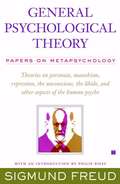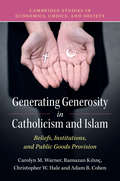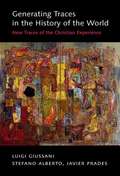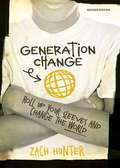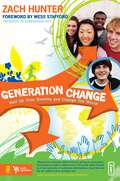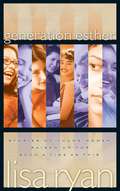- Table View
- List View
Gendered Agency in Transcultural Hinduism and Buddhism (ISSN)
by Nanette R. Spina Ute Hüsken Agi WittichFocusing on complex entanglements of religion and gender from a diversity of perspectives, this book explores how women enact agencies in transcultural Hindu and Buddhist settings. The chapters draw on original, in-depth empirical research in various contexts in South Asian religious traditions. Today, in an increasing number of such contexts, women are able to undergo monastic and priestly education, receive ordination/initiation as nuns and priestesses, and are accepted as ascetic religious leaders. They are starting to establish new religious communities within conservative traditions, occupying religious leadership positions on par with men. This volume considers the historical background, contemporary trajectories, and potential impact of the emergence of these new and powerful female agencies in conservative South Asian religious traditions. It will be of particular interest to scholars of religion, women’s and gender studies, and South Asian studies.
Gendered Morality: Classical Islamic Ethics of the Self, Family, and Society
by Zahra M. AyubiIslamic scriptural sources offer potentially radical notions of equality. Yet medieval Islamic philosophers chose to establish a hierarchical, male-centered virtue ethics. In Gendered Morality, Zahra Ayubi rethinks the tradition of Islamic philosophical ethics from a feminist critical perspective. She calls for a philosophical turn in the study of gender in Islam based on resources for gender equality that are unlocked by feminist engagement with the Islamic ethical tradition.Developing a lens for a feminist philosophy of Islam, Ayubi analyzes constructions of masculinity, femininity, and gender relations in classic works of philosophical ethics. In close readings of foundational texts by Abu Hamid Muhammad al-Ghazali, Nasir-ad Din Tusi, and Jalal ad-Din Davani, she interrogates how these thinkers conceive of the ethical human being as an elite male within a hierarchical cosmology built on the exclusion of women and nonelites. Yet in the course of prescribing ethical behavior, the ethicists speak of complex gendered and human relations that contradict their hierarchies. Their metaphysical premises about the nature of the divine, humanity, and moral responsibility indicate a potential egalitarian core. Gendered Morality offers a vital and disruptive new perspective on patriarchal Islamic ethics and metaphysics, showing the ways in which the philosophical tradition can support the aims of gender justice and human flourishing.
Gendered Spaces, Religion and Migration in Zimbabwe: Implications for Economic Development (Routledge Studies on Gender and Sexuality in Africa)
by Ezra Chitando Sophia Chirongoma Molly ManyonganiseThis book explores the intersections of gender, religion and migration within the context of post-independent Zimbabwe, with a specific focus on how gender disparities impact economic development. By demonstrating how these interconnections impact women’s and girls’ lived realities, the book addresses the need for gender equity, gender inclusion and gender mainstreaming in both religious and societal institutions. The book assesses the gender and migration nexus in Zimbabwe and examines the impact of religio-cultural ideologies on the status of women. In doing so, it assesses the transition of Zimbabwean women across spaces and provides insights into the practical strategies that can be utilised to improve their status both “at home” and “on the move”. Furthermore, chapters show how space continues to be genderised in ways that perpetuate structural inequality to challenge the exclusion of women from key social processes. Contributing to ongoing scholarly debates on gender in Africa, this book will be of interest to academics and students of Gender Studies, Women’s Studies, African Studies, Development Studies as well as advocators of human rights and gender activists.
Gendering Chinese Religion: Subject, Identity, and Body
by Jinhua Jia; Xiaofei Kang; Ping YaoGendering Chinese Religion marks the emergence of a subfield on women, gender, and religion in China studies. Ranging from the medieval period to the present day, this volume departs from the conventional and often male-centered categorization of Chinese religions into Confucianism, Buddhism, Daoism, and popular religion. It makes two compelling arguments. First, Chinese women have deployed specific religious ideas and rituals to empower themselves in various social contexts. Second, gendered perceptions and representations of Chinese religions have been indispensable to the historical and contemporary construction of social and political power. The contributors use innovative ways of discovering and applying a rich variety of sources, many previously ignored by scholars. While each of the chapters in this interdisciplinary work represents a distinct perspective, together they form a coherent dialogue about the historical importance, intellectual possibilities, and methodological protocols of this new subfield.
Gendering Modern Jewish Thought (New Jewish Philosophy and Thought)
by Andrea Dara CooperThe idea of brotherhood has been an important philosophical concept for understanding community, equality, and justice. In Gendering Modern Jewish Thought, Andrea Dara Cooper offers a gendered reading that challenges the key figures of the all-male fraternity of twentieth-century Jewish philosophy to open up to the feminine.Cooper offers a feminist lens, which when applied to thinkers such as Franz Rosenzweig and Emmanuel Levinas, reveals new ways of illuminating questions of relational ethics, embodiment, politics, and positionality. She shows that patriarchal kinship as models of erotic love, brotherhood, and paternity are not accidental in Jewish philosophy, but serve as norms that have excluded women and non-normative individuals.Gendering Modern Jewish Thought suggests these fraternal models do real damage and must be brought to account in more broadly humanistic frameworks. For Cooper, a more responsible and ethical reading of Jewish philosophy comes forward when it is opened to the voices of mothers, sisters, and daughters.
Gendering War and Peace in the Gospel of Luke
by Caryn A. ReederIn this book, Caryn A. Reeder examines the gendered language and imagery of war and peace in the Gospel of Luke. Peace is represented with the blessing of fertility, pregnancy, and newborn infants. Pregnant and nursing women, women and children in general, and feminized Jerusalem also represent the horrors of war in the Gospel - abandoned, crushed to the ground, subject to woe and distress, to the point that barren wombs and dry breasts become a blessing. Reeder argues that the representation of peace with pregnant women and newborn infants, the most vulnerable in the population, indicates that victory belongs to God. This message is clarified by the encouragement of surrender and flight from besieged Jerusalem, rather than an active defense. Notably, there are no men to defend Jerusalem in Luke's warnings of war. The Gospel undermines the masculinization of war commonly found in Greco-Roman texts by redirecting the means of making peace from the violence of victory to the unmanly act of surrender.
Genders, Sexualities, and Spiritualities in African Pentecostalism: 'Your Body is a Temple of the Holy Spirit' (Christianity and Renewal - Interdisciplinary Studies)
by Chammah J. KaundaThis book examines the complex and multifaceted nature of African Pentecostal engagements with genders and sexualities. In the last three decades, African Pentecostalism has emerged as one the most visible and profound aspects of religious change on the continent, and is a social force that straddles cultural, economic, and political spheres. Its conventional and selective literal interpretations of the Bible with respect to gender and sexualities are increasingly perceived as exhibiting a strong influence on many aspects of social and public institutions and their moral orientations. This collection features articles which examine sexualities and genders in African Pentecostalism using interdisciplinary methodological and theoretical approaches grounded within traditional African thought systems, with the goal of enabling a broader understanding of Pentecostalism and sexualities in Africa.
Gendun Chopel: Tibet's Modern Visionary (Committee On Publications In Biology And Medicine Ser.)
by Donald S. LopezThe most comprehensive work available on the life and writings of Tibet's most famous modern cultural hero.Visionary, artist, poet, iconoclast, philosopher, adventurer, master of the arts of love, tantric yogin, Buddhist saint. These are some of the terms that describe Tibet’s modern culture hero Gendun Chopel (1903–1951). The life and writings of this sage of the Himalayas mark a key turning point in Tibetan history, when twentieth-century modernity came crashing into Tibet from British India to the south and from Communist China to the east. For the first time, the astonishing breadth of his remarkable accomplishments is captured in a single, definitive volume. Here is an exploration of Gendun Chopel’s life as a recognized tulku, or incarnation of a previous master, becoming a monk and soon surpassing the knowledge of his teachers, to his travels and discoveries throughout Tibet, India, and Sri Lanka. His exposure to the wider world brought together his philosophical training, artistic virtuosity, and meditative experience, inspiring an incredible corpus of poetry, prose, and painting. While Gendun Chopel was known by the Tibetan establishment for his vast learning and progressive ideas—which eventually landed him in a Lhasa prison—he was little appreciated in his lifetime. However, since his death in 1951 his legacy, fame, and relevance across the Tibetan cultural landscape and beyond have continued to grow.No American scholar knows Gendun Chopel better than Donald Lopez, who has written six books about him, culminating in this volume. Lopez intimately and eloquently carries the reader through the life of Gendun Chopel and sets the stage for his selected writings, which present the range and depth of Gendun Chopel’s thought. The most comprehensive and wide-ranging work available on this extraordinary figure, this inaugural book of the Lives of the Masters series is an instant classic.
Gene Everlasting: A Contrary Farmer's Thoughts on Living Forever
by Gene LogsdonAuthor Gene Logsdon—whom Wendell Berry once called &“the most experienced and best observer of agriculture we have&”—has a notion: That it is a little easier for gardeners and farmers to accept death than the rest of the populace. Why? Because every day, farmers and gardeners help plants and animals begin life and help plants and animals end life. They are intimately attuned to the food chain. They understand how all living things are seated around a dining table, eating while being eaten. They realize that all of nature is in flux.Gene Everlasting contains Logsdon&’s reflections, by turns both humorous and heart-wrenching, on nature, death, and eternity, all from a contrary farmer&’s perspective. He recounts joys and tragedies from his childhood in the 1930s and &‘40s spent on an Ohio farm, through adulthood and child-raising, all the way up to his recent bout with cancer, always with an eye toward the lessons that farming has taught him about life and its mysteries.Whether his subject is parsnips, pigweed, immortality, irises, green burial, buzzards, or compound interest, Logsdon generously applies as much heart and wit to his words as he does care and expertise to his fields.
Genealogies of Mahāyāna Buddhism: Emptiness, Power and the question of Origin
by Joseph G WalserGenealogies of Mahāyāna Buddhism offers a solution to a problem that some have called the holy grail of Buddhist studies: the problem of the “origins” of Mahāyāna Buddhism. In a work that contributes both to a general theory of religion and power for religious studies as well as to the problem of the origin of a Buddhist movement, Walser argues that that it is the neglect of political and social power in the scholarly imagination of the history of Buddhism that has made the origins of Mahāyāna an intractable problem. Walser challenges commonly-held assumptions about Mahāyāna Buddhism, offering a fascinating new take on its genealogy that traces its doctrines of emptiness and mind-only from the present day back to the time before Mahāyāna was “Mahāyāna.” In situating such concepts in their political and social contexts across diverse regimes of power in Tibet, China and India, the book shows that what was at stake in the Mahāyāna championing of the doctrine of emptiness was the articulation and dissemination of court authority across the rural landscapes of Asia. This text will be will be of interest to undergraduate and postgraduate students and scholars of Buddhism, religious studies, history and philosophy.
Genealogies of Religion: Discipline and Reasons of Power in Christianity and Islam
by Talal AsadIn Geneologies of Religion, Talal Asad explores how religion as a historical category emerged in the West and has come to be applied as a universal concept. The idea that religion has undergone a radical change since the Christian Reformation--from totalitarian and socially repressive to private and relatively benign--is a familiar part of the story of secularization. It is often invoked to explain and justify the liberal politics and world view of modernity. And it leads to the view that ""politicized religions"" threaten both reason and liberty. Asad's essays explore and question all these assumptions. He argues that ""religion"" is a construction of European modernity, a construction that authorizes--for Westerners and non-Westerners alike--particular forms of ""history making.
Genealogies of Religion: Discipline and Reasons of Power in Christianity and Islam
by Talal AsadIn Geneologies of Religion, Talal Asad explores how religion as a historical category emerged in the West and has come to be applied as a universal concept. The idea that religion has undergone a radical change since the Christian Reformation—from totalitarian and socially repressive to private and relatively benign—is a familiar part of the story of secularization. It is often invokved to explain and justify the liberal politics and world view of modernity. And it leads to the view that "politicized religions" threaten both reason and liberty. Asad's essays explore and question all these assumptions. He argues that "religion" is a construction of European modernity, a construction that authorizes—for Westerners and non-Westerners alike—particular forms of "history making."
Genealogy of Nihilism (Routledge Radical Orthodoxy)
by Conor CunninghamThis text re-reads Western history in the light of nihilistic logic, which pervades two millennia of Western thought. From Parmenides to Alain Badiou, via Plotinus, Avicenna, Duns Scotus, Ockham, Descartes, Spinoza, Kant, Hegel, Heidegger, Sartre, Lacan, Deleuze and Derrida, a genealogy of nothingness can be witnessed in development, with devastating consequences for the way we live.
Genealogy of the South Indian Deities: An English Translation of Bartholomäus Ziegenbalg's Original German Manuscript with a Textual Analysis and Glossary (Routledge Studies in Asian Religion)
by Daniel JeyarajFor the first time Genealogy of the South Indian Deities, the work of Bartholomaeus Ziegenbalg (1682-1719), the first Protestant missionary in India, is made accessible to an English readership. Originally published in 1713, the text reveals Ziegenbalg's ethos in the emerging European Enlightenment and his willingness to learn from the South Indians. The text contains the original voices of knowledgeable South Indians from various religious backgrounds and presents South India in a vivid, direct and unfiltered way. In this volume Daniel Jeyaraj edits and presents the German original in an English translation. This is followed by a detailed textual analysis, a glossary and an appendix.
Generación Emergente
by Junior ZapataLa generación emergente Cómo llegar a las nuevas generaciones que alcanzarán al resto del mundo Este libro escrito desde el punto de vista totalmente latinoamericano aborda temas difíciles para los líderes cristianos de hoy. Presenta el dilema de la iglesia de América Latina ante la tormenta cultural que ha empezado. Postmodernismo, la nueva cultura juvenil y el lugar estratégico en que la iglesia latinoamericana se encuentra hoy, son algunos de los temas desafiantes que este libro controversial trata con estilo fresco y fácil de entender.
Generación de adoradores: Cómo acompañar a esta generación al trono de la gracia
by Emmanuel Espinosa Lucas Leys Danilo MonteroLa música es una poderosa herramienta, pero la adoración es más que eso. Ya basta de que los jóvenes se quejen de que la reunión fue aburrida. En este libro encontrará claves para líderes de alabanza y líderes juveniles que quieren acompañar a la nueva generación al trono de la gracia de Dios. Emmanuel Espinosa, Lucas Leys y Danilo Montero traen a la mesa años de experiencia en el tema de la adoración y el discipulado de jóvenes y adolescentes.
General Principles in the Risale-i Nur Collection for a True Understanding of Islam
by Ali UnalTheRisale-i Nur Collection is full of "general principles," not only related to the Islamic Jurisprudence but also to all the fields of Islam or Islamic life and Islamic branches of knowledge. Based on or specially favored with profound wisdom having its source in the Divine Wisdom or the Divine Name of the All-Wise, the Risale-i Nur Collection contains numerous principles, precepts, or maxims which are standards or brilliant criteria enabling people to think, believe, and live according to Islam, and to evaluate and judge things and events in Islam&’s light. They also provide people with the essentials or basic principles on which the branches of Islamic knowledge and Islamic science are based. Thus, we have tried to collect many of these principles in this book under certain titles, and in certain parts or sections according to the fields of thought and branches of knowledge to which they have a greater relevance.
General Psychological Theory: Papers on Metapsychology
by Sigmund FreudIn fifteen essays, Sigmund Freud explains his most controversial theories exposing the darkest corners of the human psyche. Best known for his research into the unconscious mind, Sigmund Freud challenged the mores of conventional American society during the early twentieth century. This collection presents many of Freud's revolutionary ideas, showing how his theories changed the way people think about their emotions and actions, opening a rich dialogue about the methods and science of the brain. In a series of essays written between 1911 and 1938, readers follow Freud through clear explanations of how neurology and psychology influence our actions and govern personality traits and emotions, including the libido, narcissism, mourning, repression, dreams, paranoia, and melancholy. This volume illustrates how Freud was not afraid to venture into unknown areas of the human mind and that he was superbly equipped to expose its secrets. Exploring the hypotheses of the most controversial psychologist of the twentieth century, in his own words, may help us understand our own behaviors.
Generating Generosity in Catholicism and Islam: Beliefs, Institutions, And Public Goods Provision (Cambridge Studies In Economics, Choice, And Society )
by Carolyn M. Warner Ramazan Kılınç Christopher W. Hale Adam B. CohenUsing an innovative methodological approach combining field experiments, case studies, and statistical analyzes, this book explores how the religious beliefs and institutions of Catholics and Muslims prompt them to be generous with their time and resources. <P><P>Drawing upon research involving more than 1,000 Catholics and Muslims in France, Ireland, Italy, and Turkey, the authors examine Catholicism and Islam in majority and minority contexts, discerning the specific factors that lead adherents to help others and contribute to social welfare projects. Based on theories from political science, economics, religious studies and social psychology, this approach uncovers the causal connections between religious community dynamics, religious beliefs and institutions, and socio-political contexts in promoting or hindering the generosity of Muslims and Catholics. The study also provides insight into what different religious beliefs mean to Muslims and Catholics, and how they understand those concepts.<P> Studies how two mainstream religions with a weak capacity to materially reward or punish members for contributing (or not) to the group still can elicit generous helping behavior, appealing to readers interested in public choice economics and rational choice theory.<P> Studies the impact of the size of the welfare state on generosity and public goods provision.<P> Will address debates in politics, public policy, and in the social sciences about the effect of government-based social welfare on private charity.
Generating Traces in the History of the World
by Luigi Giussani Stefano Alberto Javier PradesGenerating Traces in the History of the World is a synthesis of Monsignor Luigi Giussani's reflection on the Christian experience. His exploration of Christianity as an unforeseen and unforeseeable event in which the mystery became a man reveals how, by acknowledging this fact, an individual is simultaneously able to use reason and be moved by affection.
Generating Traces in the History of the World: New Traces of the Christian Experience
by Luigi Giussani Stefano Alberto Javier PradesGenerating Traces in the History of the World is a synthesis of Monsignor Luigi Giussani's reflection on the Christian experience. His exploration of Christianity as an unforeseen and unforeseeable event in which the mystery became a man reveals how, by acknowledging this fact, an individual is simultaneously able to use reason and be moved by affection. Discussing the ways in which Christ continues to be present in history through the companionship of those whom He joins to himself in Baptism, Giussani illuminates how a sense of Christ's mercy can overcome negativity and encourage a useful life. A profound and moving work, Generating Traces in the History of the World will interest all those who have been inspired by Giussani's thought.
Generation Change, Revised and Expanded Edition: Roll Up Your Sleeves and Change the World
by Zach HunterReal world. Real people. Real time. Real change. Our generation has seen the hurting world in living color. The media has brought every major human rights, health, and environmental crises right into our living rooms.… It’s easy to complain about what’s wrong with the world today. But I think my generation is tired of hearing complaints and excuses, and we’re eager to see people get busy and do something about the problems. —Zach Hunter Inside this book you will find stories about real people doing amazing things to change the world around them. You will discover a new sense of wonder about what can be and how you can help make it happen. You will encounter voices of justice and hearts of compassion. You will be inspired to find your own spark—fuel that will help ignite a generation of change.
Generation Change: Roll Up Your Sleeves and Change the World
by Zach HunterJust look around and you’ll be reminded that our world is broken. People are hurting and dying every day. But it can change. God wants you to help change the world for the better. Zach Hunter is not that different from you. He’s a teenager who likes to listen to music and hang out with his friends. But he’s also committed to ending modern-day slavery and helping address other issues facing our world. Zach believes that your generation can be the one to change things —and this book will help you find tangible ways that you can be the generation of change. In the process, Zach hopes you’ll discover God’s love for you and for people who are suffering. Inside you’ll find stories about real people who are doing amazing things to change the world around them. As you read, you may discover the thing you’re passionate about changing, and you’ll find ideas that will help you do just that. Read about people who are: • Feeding the hungry • Healing the sick • Providing clean water for the thirsty • Clothing the poor • Housing the homeless • Protecting human rights • Taking the Bible to new people • Improving the environment Don’t just sit there wondering why our world is so messed up. Get up and be the generation of change.
Generation Esther: Stories of Young Women Raised Up for Such a Time as This
by Lisa RyanJust as Esther was set apart for her destiny by her character and her commitment to God, He is preparing young women today to influence their generation for Him. This companion book to For Such a Time as This profiles the lives of several modern-day Esthers, from headliners like Rebecca St. James, Heather Mercer and Dayna Curry to low-profile, unexpected heroines. Each girl's story illustrates important character strengths, such as purity, friendship, honesty, advocacy, prayer, servanthood, and courage, that influenced her response to challenging choices and cultural pressures. These profiles will inspire every young woman who wonders what God can do through her.You're more than just a pretty face. You want something more. In a culture that wants you to live for sex, hate your parents, become apathetic, and get wasted, something inside is calling you to a life of purpose. And you're not alone. Rebecca St. James, Heather Mercer, and Dayna Curry are just a few examples of Gen E girls--young women who, like Esther in the Bible, have been set apart for an incredible destiny by their intense commitment to God. These profiles of modern-day Esthers, ordinary girls in the hands of an extraordinary God, will inspire you to f ind out how God is preparing you--for such a time as this.From the Trade Paperback edition.
